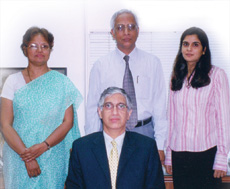Brands in safe hands
24 June 2006
 Brand piracy has become a major crime worldwide. What steps is the Tata Group taking to protect the brand?
Brand piracy has become a major crime worldwide. What steps is the Tata Group taking to protect the brand?
The Tatas have been doing business for more than 140 years and the Tata brand is trusted by all stakeholders. The Tata mark, which appears on a whole range of products and services, stands for quality and ethical values. It is essential for us to protect this valuable legacy.
This protection calls for even more vigilance in product and service segments where the Tatas are not present. Infringements in these areas have a negative effect on the reputed and trusted Tata brand because they mislead people into thinking the Tatas have forayed into a new business area.
What is the surveillance system for spotting an infringement? How do you track such violations?
We are a small team at Tata Sons in Mumbai working on brand protection. However, for surveillance, we leverage the entire Tata Group: its over two lakh employees, the distributors, dealers and business associates. People on the move spot most infringements. They convey it to their offices, which in turn inform us.
On getting information about a counterfeit case, the key is to handle it with speed and confidentiality as the offender withdraws his goods or services from the market or changes the address the moment he gets a hint that he has been caught. Also, in India, it is much easier for a person to resume the counterfeiting activity under a new identity than in developed jurisdictions, as we do not have social security numbers or other methods of tracking an individual.
What is the next step after you become aware of a violation ?
We appoint an expert for initial investigations and based on his report prepare our action plan. For instance in the counterfeit Tata cutlery case, we had been hearing about salesmen selling Tata cutlery in some housing colonies, but it was only recently that we nabbed a salesman after receiving a phone call from one of our retired employees who lived in the colony. In another case, when we carried out a raid in the premises of a pressure cooker manufacturer, we discovered dies of not just the Tata mark but also those of many other business groups.
Nabbing such salesmen is not the end-objective but it helps us to reach the real culprits - the manufacturer and distributor of the counterfeit goods. In most such cases, the culprits don't have huge factories or large establishments; they usually work out of small, makeshift workshops. Hence an injunction cannot be issued against them. When their illegal activities are discovered, they just move to a new place and continue producing counterfeit goods.
